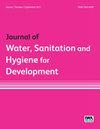难民青年中的水不安全与性暴力和基于性别的暴力:来自乌干达人道主义环境的定性见解
IF 1.4
4区 环境科学与生态学
Q3 WATER RESOURCES
Journal of Water Sanitation and Hygiene for Development
Pub Date : 2022-11-14
DOI:10.2166/washdev.2022.236
引用次数: 4
摘要
难民青年不成比例地经历性暴力和基于性别的暴力以及水不安全,但他们在水不安全背景下的性暴力和性别暴力经历研究不足。在这项定性研究中,我们在乌干达Bidi Bidi难民定居点对16-24岁的难民青年进行了六个焦点小组(n=48)和深入的个人访谈(IDI)(n=12),并对难民长者(n=8)进行了IDI。我们应用了基于社会背景框架的主题分析,发现(1)性暴力和基于性别的暴力是性别的,青春期女孩和年轻妇女(AGYW)是暴力的目标(象征性背景),并与AGYW的取水角色相关的性别规范交织在一起(关系性背景);(2) 缺水和场外供水基础设施,加上照明有限,提供了不安全的环境,加剧了AGYW的性暴力和基于性别的暴力风险(物质背景);(3) 参与者提出的解决与水不安全相关的性暴力和基于性别的暴力的方案包括让男性和社区参与对话和水收集(关系背景)、技术(如太阳能照明)、改善安全和增加供水点(物质背景)。调查结果表明,有必要将水和环境卫生的发展与性暴力和基于性别的暴力的预防和性健康(如强奸后护理)干预措施相结合。难民青年和社区应该有意义地参与开发与环境相关的性别变革服务,以减轻性暴力和基于性别的暴力风险,促进健康和权利。本文章由计算机程序翻译,如有差异,请以英文原文为准。
Water insecurity and sexual and gender-based violence among refugee youth: qualitative insights from a humanitarian setting in Uganda
Refugee youth disproportionately experience sexual and gender-based violence (SGBV) and water insecurity, yet their SGBV experiences in the context of water insecurity are understudied. In this qualitative study, we conducted six focus groups (n = 48) and in-depth individual interviews (IDI) (n = 12) with refugee youth aged 16–24, and IDI with refugee elders (n = 8) in Bidi Bidi refugee Settlement, Uganda. We applied thematic analysis informed by a social contextual framework and found that (1) SGBV is gendered, whereby adolescent girls and young women (AGYW) were targets for violence (symbolic context), and is intertwined with gender norms linked to AGYW's water collection roles (relational context); (2) water scarcity and off-site access to water infrastructure, combined with limited lighting, provide insecure environments that exacerbate AGYW's SGBV risks (material context); (3) participant generated solutions to water insecurity-related SGBV included engaging men and communities in dialogue and water collection (relational context), technology (e.g., solar lighting), improved security, and additional water points (material context). Findings signal the need to integrate water and sanitation hygiene development with SGBV prevention and sexual health (e.g., post-rape care) interventions. Refugee youth and communities should be meaningfully engaged in developing contextually relevant, gender transformative services to mitigate SGBV risks and advance health and rights.
求助全文
通过发布文献求助,成功后即可免费获取论文全文。
去求助
来源期刊

Journal of Water Sanitation and Hygiene for Development
WATER RESOURCES-
CiteScore
3.10
自引率
11.80%
发文量
58
审稿时长
16 weeks
期刊介绍:
The Journal of Water, Sanitation and Hygiene for Development is a peer-reviewed journal devoted to the dissemination of high-quality information on the science, policy and practice of drinking-water supply, sanitation and hygiene at local, national and international levels.
 求助内容:
求助内容: 应助结果提醒方式:
应助结果提醒方式:


